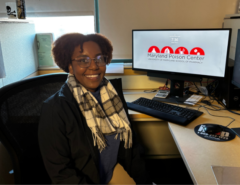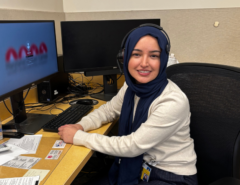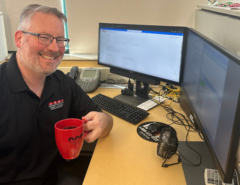We’ve seen what a typical day is like at the Maryland Poison Center (MPC), we’ve met some of the experts who answer your calls, and we’ve seen what poisons the MPC gets called about for children and adults. Now, we’ll discuss the questions callers have frequently asked our experts over the past 47 years.
If you have a question that does not appear below, you can always visit our website for more information.
Without further ado, let’s get into the questions.
How do I reach the MPC?
Grab a phone, mobile or landline, and call 1-800-222-1222. This is a nationwide number, so you can call from anywhere in the United States and it will connect you directly to a local poison center. If you call from Maryland — with the exception of Prince George’s and Montgomery Counties, which go to the National Capital Poison Center — you will be connected to the MPC. Another easy way to reach the poison center is to program our number in your phone. Just text the word “poison” to 797979, and save the contact card in your phone.
Is there a national poison center?
No. Poison centers are local services, with each poison center assigned to a specific service area. Currently, there are 55 poison centers in the United States. Some states may have more than one poison center, depending on their assigned service area. Other states do not have a poison center physically located in their state, but receive services from an out-of-state poison center. There are even poison control centers that cover Puerto Rico, the Federated States of Micronesia, American Samoa, the U.S. Virgin Islands, and Guam.
Is there a cost associated with calling the poison center?
No. Calls to the poison center are free. We won’t even ask for your insurance information. . A call to the MPC is faster and a lot less expensive than a visit to the emergency room. About 60 percent of all cases reported to the MPC are managed safely where they happen.
How is the MPC funded if calling is free?
The MPC is primarily supported through state higher education dollars, as well as federal grants and private contracts. It is part of the Department of Pharmacy Practice and Science at the University of Maryland School of Pharmacy. Funding for poison centers has decreased in recent years. When budget cuts are applied to higher education, they lead to a reduction in the MPC’s operating budget. Find out how you can make a donation to help the MPC continue its lifesaving work.
Who answers the phones?
A common myth about poison centers is that volunteers or automated voices answer our phones. That couldn’t be further from the truth! Our phones are answered by specially trained pharmacists and nurses 24 hours a day, every single day of the year. These individuals are certified as specialists in poison information (SPI) by the American Association of Poison Control Centers, and they must be recertified every seven years. The specialists at the MPC have more than 250 years of combined experience handling poison exposure cases.
What kinds of calls do the specialists at the MPC handle?
People call the MPC for a variety of reasons. Our specialists regularly receive calls about:
- Drugs and medicines (e.g., prescription, over-the-counter, vitamins, supplements, veterinary, or illegal)
- Household, garden, and personal care products
- Chemicals (at home or work)
- Plants (e.g., mushrooms, berries, and indoor and outdoor plants)
- Bites and stings (e.g., insects, snakes, animals)
- Gases and fumes
- Food poisoning
- Any item that produces an unwanted or unexpected reaction
Call the MPC at 1-800-222-1222 as soon as you suspect a poisoning or overdose. Don’t wait for symptoms.
Will specialists at the MPC answer non-emergency calls?
Yes, poison specialists answer non-emergency calls. These calls may about topics such as safe use and storage of household products, or whether a plant you received as a gift is poisonous or not. If there is a poison emergency call on another line, the specialist will handle that call first, but will come back to answer your question. Most importantly, calling for information may prevent a poisoning in the future.
Will specialists at the MPC answer calls about pets?
Yes. Although our specialists are primarily trained to address poison exposures in humans, they will try their best to answer questions about pets as well. We also recommend contacting the ASPCA Animal Poison Control Center or the Pet Poison Helpline for more specific information.
If I suspect a poisoning or overdose, shouldn’t I go to the emergency room immediately?
If the person is not breathing, is unconscious, or having seizures, contact 911 right away. Otherwise, a call to the MPC is a great place to start. When patients can be safely managed at home, we will make follow up calls to ensure patients continue to improve. For patients who are sent to the hospital, our specialists will work with the doctors and nurses to develop a treatment plan that may help them recover faster and follow through until they are discharged.
With so much information available online, can I use the internet to find an answer to my poisoning or overdose problem?
Calling the MPC as soon as a poisoning or overdose is suspected is best. A call to the poison center means that you will receive information specific to your situation from a poison expert. Searching the internet will only provide general information, which could be incorrect or outdated. Search engines provide thousands of results, so it will also take more time and effort to review all of the information available than to call the poison center — time that could be vital to saving you or a loved one’s life.
Can the MPC provide a poison prevention program for my workplace or local organization?
Absolutely! The MPC is available to conduct staff trainings, workshops, lectures, and health fairs in our service area (entire state of Maryland, except Prince George’s and Montgomery Counties.) While we will make every attempt to attend your event, please keep in mind that we have a limited staff for outreach and cannot attend all events to which we are invited. If we are unable to attend your event, we will make educational materials available for you to use at the event. For more information, please visit our “Request a Program” webpage.
Not in Maryland? These questions and answers generally apply to the 54 other poison centers as well. Click here to find your local poison center. Useful information can also be found in numerous places, including:
- Our Facebook and Twitter pages, which are updated every week day.
- Our eAntidote blog, where new blogs are published twice a month.
- Our Poison Prevention Press newsletter, which is published every other month.
- Our website.
As always, if you suspect a poisoning or overdose, call 1-800-222-1222 right away. Don’t wait for symptoms. Your call is free and confidential.





Leave a Reply